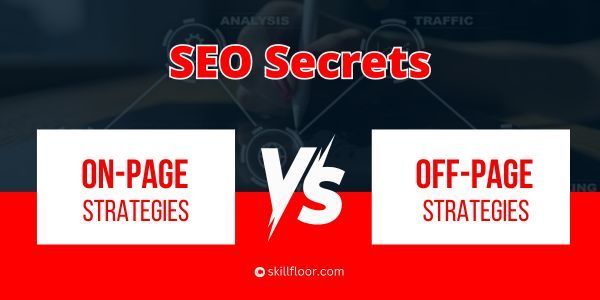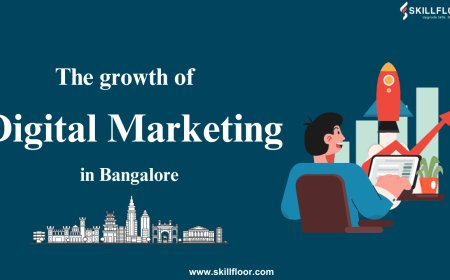What is On-Page SEO and Off-Page SEO
Learn the key differences between On-Page SEO and Off-Page SEO. Optimize your website's content, structure, and authority to improve search engine rankings and boost organic traffic.

"Did you know two important SEO components could determine your website's search engine visibility? So on-page SEO and off-page SEO have the answer to the solution."
Having worked in the field of digital marketing for a long time, I've seen companies make major investments in their online presence only to overlook these essential elements. It would be like trying to win a race with a flat tire if you didn't have a thorough understanding of both On-Page SEO and Off-Page SEO. One client who comes to mind seemed to be doing everything right. Their design was eye-catching, and their substance was excellent. However, they weren't ranking in the order they wanted. Upon a closer look, we found that they neglected both on-page SEO and off-page SEO efforts.
Let's explore these two concepts, go over how they differ, and how they complement one another, and show you how to use them both to create an effective SEO plan. Now let's get started!
What is SEO?
Let's take a moment to clarify what SEO is before getting into On-Page SEO and Off-Page SEO. The process of improving a website to increase its visibility on search engine results pages (SERPs) is known as SEO (Search Engine Optimization). Making it simpler for search engines like Google to read, understand, and rank a website's content is the goal of SEO, which attempts to increase organic (non-paid) traffic to a website.
Increasing the relevance of your website to both people and search engines is the fundamental goal of SEO because it can be a challenging and changing subject. A great SEO strategy is made up of many components that may be divided into two main categories: On-Page SEO and Off-Page SEO.
Types of SEO
There are various categories in SEO, each focusing on specific elements of optimization. There are other categories worth mentioning in addition to the two main types of SEO, which are On-Page SEO and Off-Page SEO:
This involves making sure search engines can efficiently crawl and index your website by optimizing its backend. It takes into account things like mobile friendliness, SSL certifications, structured data, and site speed.
2. Local SEO
Optimizing your website to show up in location-based search results is the main goal of local SEO. This is especially important for companies that specialize in certain regions. Building and refining your Google My Business profile, obtaining local backlinks, and producing favorable reviews are all part of it.

3. E-commerce SEO
E-commerce SEO for retailers on the internet focuses on making product pages, category pages, and product descriptions more visible for search terms associated with online product purchases. This can involve improving internal links, product descriptions, and photos.
After covering some more basic SEO categories, let's explore in more detail what On-Page SEO and Off-Page SEO involve and why they are both essential to the success of your website.

What is On-Page SEO?
All the parts on your website that you have direct control over are referred to as on-page SEO. To rank higher and receive more relevant traffic from search engines, involves optimizing individual web pages. On-page SEO includes everything, including the HTML code that powers your pages and the content you write.
1. Content Optimization
Content is at the core of On-Page SEO. SEO can only raise your website to the top of search results with high-quality content. Important, relevant, and problem-solving content is given priority by search engines like Google.
-
Keyword Research: Selecting the appropriate keywords is the first step towards effective on-page SEO. These are the keywords that members of your target audience are searching for. Find keywords that are related to your niche using tools like Ahrefs or Google Keyword Planner, then naturally integrate them into your writing.
-
LSI Keywords: You should incorporate LSI (Latent Semantic Indexing) keywords in addition to your basic keywords. These belong to terms that help in the context of your content's understanding by search engines. If your primary keyword is "content marketing," for example, some relevant long-tail keywords are "SEO strategies," "content creation," or "digital marketing."
-
Content Quality: Engaging and informative Content is of the best quality. It should respond to the searcher's query and address their goal. To make your content easier to navigate for both viewers and search engines, make sure it is well-structured with separate headings and subheadings (H1, H2, H3).
2. Meta Tags Optimization
Meta tags give search engines important details about your website and are an important component of On-Page SEO.
-
Title Tag: In search results, the title tag is shown as the headline that can be clicked. To prevent getting cut off in SERPs, it should be appealing, contain your main keyword, and be no more than 60 characters.
-
Meta Description: A brief description of the content on your page can be found in the meta description. While it doesn't impact your ranking, a strong meta description can raise your click-through rate. Aim for 155 characters, making sure to organically include your main keyword.

3. URL Structure
In addition to helping search engines, a simple URL format enhances user experience. A good URL contains the target keyword and is short and descriptive. For example, use something simple like "www.example.com/seo-guide"
instead of a long complex URL like
"www.example.com/page123456."
4. Internal Link
Links inside your website lead to other pages. They ease user navigation on your website and make it easier for search engines to crawl it. Within your content, use internal links to point readers toward relevant information and enhance the overall SEO structure of your website.
5. Image Optimization
Any web page must have images, but they also need to be optimized for on-page search engine optimization. To provide search engines with additional information about the photos on your page, use alt text and descriptive file names. In addition, reduce the size of your photographs to help your website load faster, as this impacts ranking.
6. Mobile Optimization
Because mobile devices account for over half of all web traffic, making sure your website is optimized for mobile is essential for on-page search engine optimization. To rank well in mobile search results, a design must be responsive, meaning it must load quickly on mobile devices and adjust to varied screen sizes.
Benefits of On-Page SEO
-
Improved Search Engine Visibility: On-page SEO makes your website easier for search engines to understand by optimizing its content, meta tags, internal linking, and keywords. This increases the probability that your website will rank higher.
-
Enhanced User Experience: You can make your website more user-friendly by using proper on-page SEO, which ensures quicker load speeds, mobile optimization, and well-structured content.
-
Increased Organic Traffic: Your website will receive more focused, organic traffic as a result of optimized pages' ability to rank higher in search results.
-
Improved Conversion Rates: By providing the appropriate information, well-optimized content that is in line with user intent improves engagement and increases conversion rates.
-
Better Website Performance: Technical elements of On-Page SEO, such as enhancing site speed, ensuring a secure connection (HTTPS), and removing broken links, lead to an overall improvement in performance.
-
Control Over Optimization: Using performance data as a direction, On-Page SEO provides you complete control over the content and structure of your website, enabling you to make ongoing improvements.

What is Off-Page SEO?
Off-Page SEO refers to the activities done outside of your website that affect your rankings, whereas On-Page SEO focuses on optimizing features within your website. It involves improving the authority and trustworthiness of your website from outside sources.
1. Backlink Building
In Off-Page SEO, creating high-quality backlinks is essential. Links leading to your website from other websites are known as backlinks. Your website gains more credibility from links from authoritative websites.
-
Quality Over Quantity: In terms of backlinks, quality takes priority over quantity. Many backlinks from irrelevant or low-quality websites can be offset by a single backlink from a reliable website.
-
Anchor Text: The words that are used as links pointing to your website are also important. When a keyword is relevant, it informs search engines about the content of the page it links to.
2. Social Signals
While it isn't a direct ranking component, off-page SEO can benefit greatly from social network usage. Your content becomes more visible and may even draw backlinks from other websites when it is widely shared on social media platforms. Your content has a higher chance of being seen if it is more interesting and shareable.
One well-liked Off-Page SEO strategy is guest blogging, in which you contribute articles to other websites in return for a hyperlink to your own. It's a useful strategy for expanding your audience and establishing influence in your field. Make sure, however, that you guest write on reputable websites that are relevant to your field of expertise.
4. Brand Mentions
Brand mentions have the power to impact your Off-Page SEO efforts even in the absence of a direct backlink. Search engines are informed that your company is reliable and relevant when credible websites or influencers mention your brand. You can become more authoritative overall in your niche with these mentions.
5. Influencer Marketing
Engaging in partnerships with key individuals within your field may improve your Off-Page SEO efforts. Influencers can spread your content to their large networks, resulting in increased website traffic and a higher chance of obtaining important backlinks.
Benefits of Off-Page SEO
-
Increased Authority and Trust: Off-page SEO helps position your website as an authority in its industry by obtaining high-quality backlinks from reliable websites, which search engines honour with higher ranks.
-
Improved Search Engine Rankings: Off-page SEO signals provide your material a boost in search engine rankings by acting as "votes of confidence" from other websites, such as social media shares, backlinks, and brand mentions.
-
Increased Reach and Exposure: Your material reaches a wider audience and raises brand awareness when it is referenced or linked to by reliable sources.
-
Higher Domain Authority (DA): Off-page SEO raises your domain authority, which helps your website rank higher on all of its pages. This is especially true with link-building.
-
Improved Social Engagement: Off-page SEO often involves social media marketing, where interaction and content sharing increase traffic and brand awareness.
-
Long-Term Benefits: In contrast with sponsored advertisements, the advantages of an effective off-page SEO strategy build over time because backlinks and brand mentions boost ranks and drive traffic long after they are established.
How On-Page SEO and Off-Page SEO Work Together
While they are different from one another, on-page SEO and off-page SEO are complementary strategies. Consider them to be both sides of a single coin. To develop a well-rounded and effective SEO strategy, you need both.
|
Aspect |
On-Page SEO |
Off-Page SEO |
How They Work Together |
|
What it is |
Optimizing your website’s content and structure. |
Getting links and mentions from other websites. |
On-Page makes your site good, and Off-Page gets other sites to verify it. |
|
Keywords |
Adds keywords to your site’s content. |
Other websites link to your content. |
Good content (On-Page) attracts links (Off-Page), boosting your search ranking. |
|
Content |
Creates useful, high-quality content. |
Promotes your content through other sites. |
Quality content gets shared, improving both On-Page SEO and Off-Page SEO results. |
|
Links |
Links to other pages on your site. |
Other sites link to your website. |
Internal links help navigation, and external links boost your authority. |
|
Backlinks |
Not directly involved. |
Gets backlinks from other websites. |
Good content brings in backlinks, improving your site’s ranking. |
|
User Experience (UX) |
Makes the website user-friendly and fast. |
Positive user interactions and shares help. |
A great user experience leads to more shares and links, improving Off-Page SEO. |
|
Meta Tags |
Optimizes titles and descriptions for search engines. |
Not directly related, but helps with sharing. |
Clear meta tags encourage clicks and shares, helping SEO. |
|
Social Sharing |
Creates shareable content. |
Gets more shares and visibility from other sites. |
Shareable content boosts both visibility and backlinks, improving your ranking. |
Common Mistakes to Avoid in On-Page SEO and Off-Page SEO
According to any SEO strategy, there are common mistakes that could prevent you from moving forward. The following are some risks to be aware of:
-
Keyword Stuffing: Avoid stuffing your material with too many keywords to manipulate search engine rankings. This practice is known as keyword stuffing. Search engine penalties may result from this.
-
Ignoring User Experience: Although search engine optimization (SEO) focuses on search engine optimization, keep in mind that people are the main audience for your website. Make sure your website is user-friendly and provides a satisfying experience.
-
Low-Quality Backlinks: Creating backlinks from irrelevant or low-quality websites could lower your rankings. Focus on obtaining links from reliable, authoritative websites.
Effective methods need an understanding of the differences between On-Page and Off-Page search engine optimization. While off-page SEO builds authority through social media signals, backlinks, and brand mentions, on-page SEO concentrates on making your site's content and structure more search engine-friendly.
Both are essential; you will gradually raise your search engine ranks by producing high-quality content, enhancing user experience, and obtaining worthwhile backlinks. Although SEO takes time, persistent work will boost your website's traffic, exposure, and success.































































